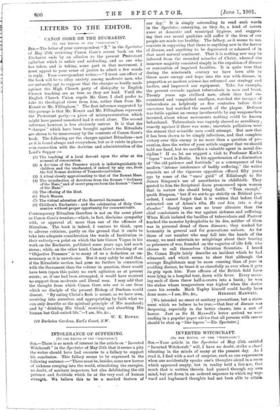INTOLERANCE OF SUFFERING.
[To THE EDITOR OF THE "SPECTATOR.") SIR,—There is so much of interest in the article on "Inverted Witchcraft" in the Spectator of May 25th that it seems a pity the writer should have had recourse to a fallacy to support his conclusion. This fallacy seems to be expressed in the following sentence :—" There must be, besides, some new horror of sickness creeping into the world, stimulating the energies, no doubt, of sanitary inspectors, but also debilitating the old patience and fortitude which lie at the very roof of human strength. We believe this to be a marked feature of our day." It is simply astounding to read such .words in the Spectator, conveying, as they: do, a kind of covert sneer at domestic and municipal hygiene, and suggest. Mg that our moral qualities will suffer if the fives of our people are made too healthy. The fallacy, as it seems to me, consists in supposing that there is anything new in the horror of disease, and anything to be deprecated or ashamed of in that most natural sentiment. That it is nothing new may be inferred from the recorded miracles of Christ, whereof the immense majority consisted simply in the expulsion of disease or restoration of impaired faculties. It is quite true that during the nineteenth century we have been able to throw more energy and hope into the war with disease, in proportion as modern science has reformed our strategy and tactics, and improved our equipment. Take, for example, the present crusade against tuberculosis in man and beast. Twenty years ago civilised men, albeit they had en- countered, and vanquished smallpox, watched the ravages of tuberculosis as helplessly as five centuries before. their ancestors had watched the march of the plague. Defence was futile against an enemy invulnerable by any weapons then invented, about whose movements nothing could be known beforehand. Tuberculosis was vaguely classed as nereditary ; remedy against it there was none ; uncertain palliatives Were the utmost that scientific men could attempt. But now that it has been shown to be simply infectious, and that complete victory over this enemy is no more than a question of pre- caution, does the writer of your article suggest that we should hold our hand, lest we sacrifice a valuable agent in moral dis- cipline? If so, let me suggest a visit to Professor Koch's "lupus" ward in Berlin. In his apprehension of a diminution of "the old patience and fortitude" as a consequence of. the modern "intense intolerance of bodily suffering," the writer reminds me of the vigorous opposition offered fifty years ago by some of the unco' guid" of Edinburgh to Sir James Simpson's use of anmsthetics in childbirth. They quoted to him the Scriptural doom pronounced upon woman that in sorrow she should bring forth. " True . enough," quoth Simpson, "but if we are to go strictly on Biblical pre- cedent, I cannot forget that it is written that before God extracted one of Adam's ribs, He cast him into a deep slumber." Surely there are no truer altruists than the chief combatants in the war against sickness and suffering. When Koch isolated the bacillus of tuberculosis and Pasteur tracked the monster hydrophobia to its den, neither of them was in personal dread of these diseases ; they worked for humanity in general. and for generations unborn. As for those of our number who may fall into the bands of -the enemy, we need entertain no misgivings about their bearing as prisoners of war, founded on the vagaries of idle folk who choose to call themselves Christian Scientists. I heard Dr. Conan Doyle lately describe an incident which. he had Witnessed, and which seems- to show that although the average Englishman may be more cunning than of yore in avoiding disease, he bears it as cheerfully as ever when it gets its grip upon him. Four officers of the" British field force were lying in a hospital tent, down with fever. Every morn- ing each of them threw half-a-crown into a basin ; he won the stakes whose temperature was highest when the -doctor came his rounds. Mark Tapley himself could hardly have . [We intended no sneer at sanitary precautions, but a state- ment which we believe to be true,—that fear of disease was deepening, especially in the better classes, into a sort of horror. Just as Sir H. Maxwell's letter arrived we were reading in a popular paper advice that all persons with cancer should be shut up "like lepers."—En. Spectator.]






































 Previous page
Previous page